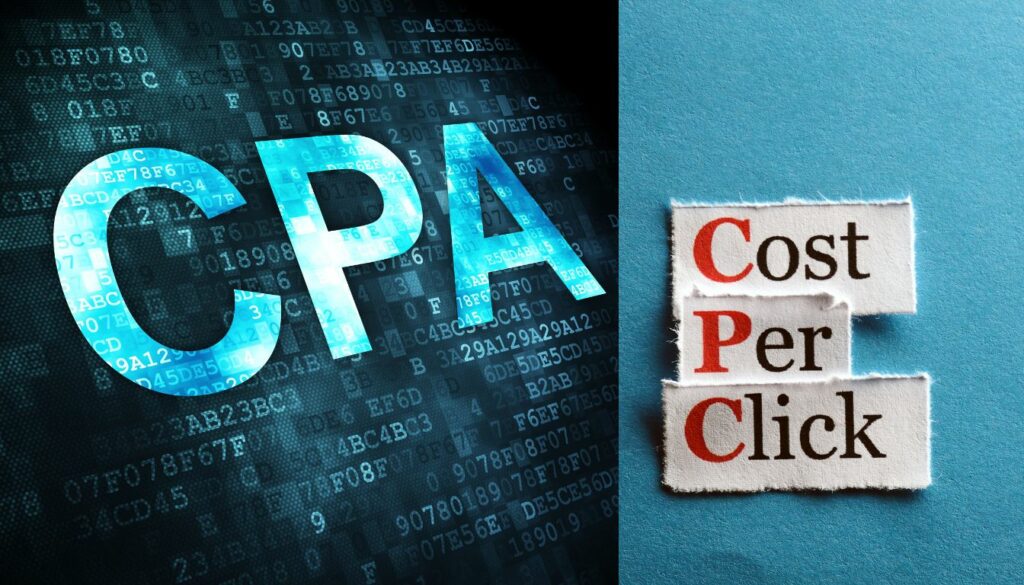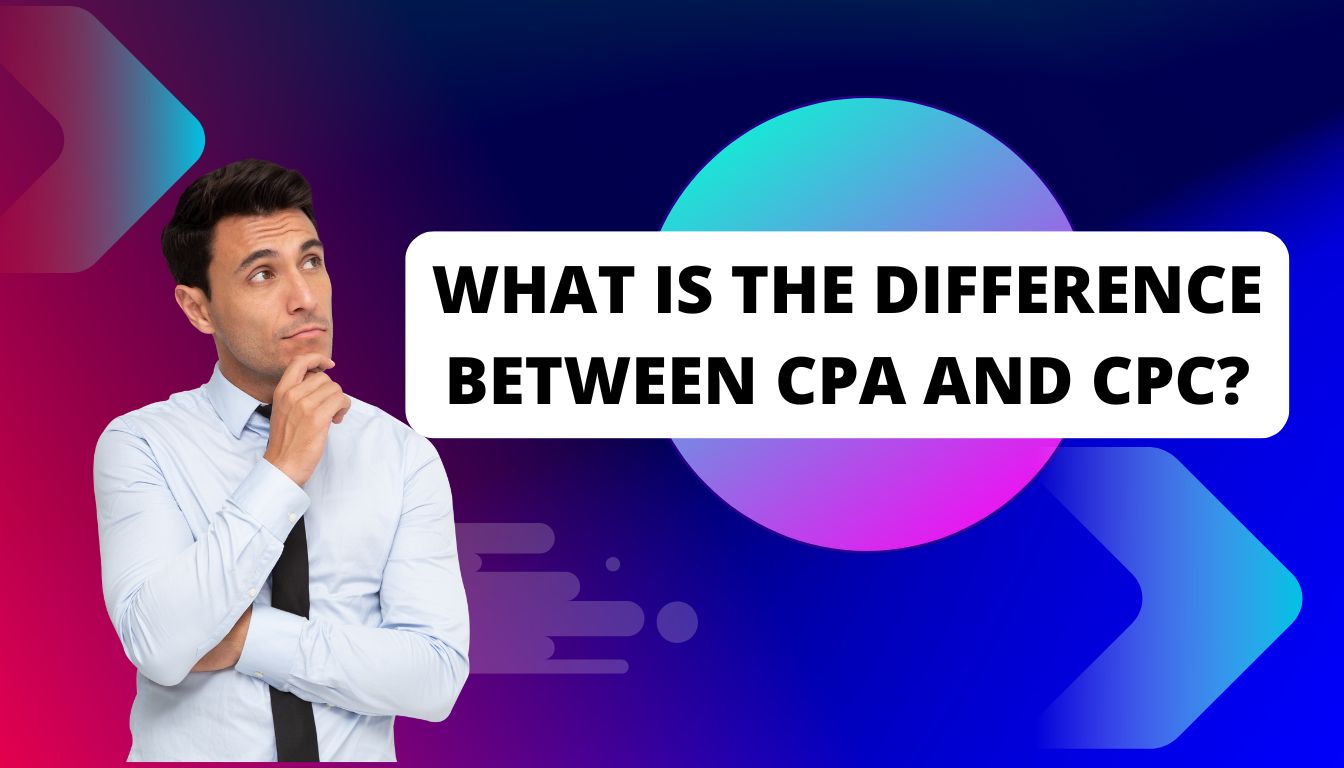When running online ads, you may wonder, “What is the difference between CPA and CPC?” These two advertising models are essential in digital marketing. Choosing the right one can save you money and help you meet your goals. Let’s break it down step by step in simple terms.
What Does CPA and CPC Mean?
Before we dive into the details, let’s first define these two terms in detail and understand their practical applications.
- CPA (Cost Per Acquisition): You pay when someone takes a specific action, like buying a product, signing up for a service, or completing a form. This model ensures you only spend money on actual results.
- CPC (Cost Per Click): You pay every time someone clicks on your ad, regardless of what they do next. This is ideal for generating website traffic and increasing visibility.
Here’s a quick comparison to make things clearer:
| Term | What You Pay For | Goal | Best For |
|---|---|---|---|
| CPA | Actions (sales, sign-ups) | Conversions (results) | Conversions-focused campaigns |
| CPC | Clicks on the ad | Driving traffic to a site | Awareness-focused campaigns |
By understanding these definitions, you can start to see how each model might align with your marketing needs.

How Does Each Work?
CPC: Cost Per Click
CPC focuses on clicks. Here’s how it works:
- You Create an Ad: Make an ad designed to attract clicks. This could be a banner ad, a search ad, or even a social media ad.
- You Set a Bid: Choose how much you’re willing to pay per click. This bid determines your ad’s competitiveness.
- You Get Traffic: Each click sends someone to your site, and you pay for each visitor.
This model works best if your goal is to bring more visitors to your site or promote brand awareness.
CPA: Cost Per Acquisition
CPA is all about results. Here’s how it works:
- You Set a Goal: For example, getting people to buy a product, sign up for a newsletter, or download an app.
- You Create a Campaign: Design an ad focused on driving specific actions.
- You Pay Only for Results: If someone buys, signs up, or completes the desired action, you pay for that acquisition.
This model is great if you want to ensure you’re only paying for actual outcomes, which can make your budget more efficient.
When Should You Use CPC or CPA?
Choosing the right model depends on your goals, audience, and budget. Here’s a guide to help:
- Use CPC If:
- You want to drive traffic to your site.
- Your focus is on brand awareness.
- You have a small budget and want to control costs.
- You’re testing new campaigns or ads and need data on click behavior.
- Use CPA If:
- You need more conversions, like sales or sign-ups.
- You want to minimize risk and pay for results.
- Your site is well-optimized to turn visitors into customers.
- You’re focused on maximizing ROI and reducing wasted ad spend.
Understanding when to use each model can save you money and make your campaigns more effective.
Examples of CPC and CPA in Action
Let’s look at real-world examples to see how these models work:
Example 1: CPC
A clothing store wants more visitors to its website. They use CPC ads:
- They bid $1 per click.
- 1,000 people click the ad.
- Total cost: $1,000.
Even if visitors don’t buy anything, the store pays for clicks. However, the traffic can help build brand awareness and future sales.
Example 2: CPA
An online course platform wants sign-ups. They use CPA ads:
- They set a $50 CPA.
- For every sign-up, they pay $50.
- 20 people sign up.
- Total cost: $1,000.
They only pay for results, so it’s less risky and ensures their budget goes toward meaningful actions.
Example 3: Combining CPA and CPC
A fitness app launches a new product. They use CPC ads initially to attract traffic and gather data. Then, they switch to CPA ads once they’ve optimized their landing pages and conversion process.
Pros and Cons of CPA and CPC
Let’s weigh the pros and cons of each model in more detail:
CPC Pros:
- Drives Traffic: Ideal for generating website visits and brand visibility.
- Predictable Costs: You know how much each click will cost.
- Easy to Track: Simple to monitor clicks and adjust bids.
- Good for Testing: Great for experimenting with new audiences or keywords.
CPC Cons:
- No Guarantee of Results: Clicks don’t always mean sales.
- High Bounce Rates: Visitors may leave without taking action.
- Potential Wasted Spend: If targeting isn’t optimized, costs can add up.
CPA Pros:
- Pay for Results: Ensures budget goes toward meaningful actions.
- Better ROI: Focuses on high-value outcomes.
- Efficient Use of Budget: Eliminates paying for uninterested traffic.
CPA Cons:
- Higher Upfront Cost: Often requires a larger budget to start.
- Complex Setup: Needs well-optimized campaigns and landing pages.
- Longer Setup Time: Requires more planning and testing upfront.
Here’s an updated table for easy comparison:
| Model | Pros | Cons |
|---|---|---|
| CPC | Drives traffic, predictable, good for testing | No guaranteed results, high bounce rates |
| CPA | Pays for results, better ROI, efficient budget | Higher cost, complex setup, longer planning |
How to Decide Between CPA and CPC
Not sure which to choose? Use this checklist:
- Goal: Do you want traffic or conversions?
- Budget: Is your budget small (CPC) or flexible (CPA)?
- Risk Tolerance: Do you prefer predictable costs (CPC) or results-focused spending (CPA)?
- Site Readiness: Is your site optimized to convert visitors?
Decision Matrix:
| Question | If Yes, Choose |
|---|---|
| Do you need more visitors? | CPC |
| Do you want guaranteed results? | CPA |
| Is your site optimized? | CPA |
| Are you testing a new audience? | CPC |
Key Metrics to Track
Tracking success is essential for improving campaigns. Here’s what to measure:
For CPC:
- CTR (Click-Through Rate): How often people click on your ad.
- CPC (Cost Per Click): The average cost for each click.
- Quality Score: Google’s rating of your ad relevance.
- Bounce Rate: Percentage of visitors who leave without taking action.
For CPA:
- Conversion Rate: Percentage of clicks that lead to actions.
- ROAS (Return on Ad Spend): Revenue earned per dollar spent.
- AOV (Average Order Value): How much customers spend.
- Cost Per Lead (CPL): If applicable, how much each lead costs.
By regularly analyzing these metrics, you can make data-driven decisions to improve performance.
Trends in CPA and CPC
Digital advertising is evolving rapidly. Here are the latest trends:
- AI Bidding: Tools like Google Smart Bidding and Meta’s Advantage+ campaigns use machine learning to optimize costs and performance automatically.
- Hybrid Strategies: Many advertisers combine CPC and CPA in the same campaign to balance traffic generation with conversions.
- Better Analytics: Advanced tools now make tracking user behavior and campaign success easier than ever before.
- Audience Segmentation: Advertisers are focusing on hyper-targeted campaigns to ensure higher relevance and engagement.
What Experts Say
Digital marketing pros often recommend using both models strategically. For example:
- Start with CPC: Use CPC ads to test new audiences and gather data on click behavior.
- Switch to CPA: Once you’ve optimized your landing pages and targeting, use CPA to focus on conversions and maximize ROI.
Combining both strategies allows you to scale campaigns effectively.
Conclusion
So, what is the difference between CPA and CPC? In simple terms:
- CPC is great for driving traffic and building brand awareness.
- CPA is better for paying only for results, making it ideal for conversions.
The right choice depends on your goals, budget, and strategy. By understanding these models, you can run smarter, more effective ad campaigns.
Now it’s your turn! Which model do you prefer? Experiment with both to find what works best for your business and grow your success in online advertising!
If you’re looking for a program that can guide you every step of the way, the Wealthy Affiliate program is perfect for beginners and experts alike. With a comprehensive training platform covering everything from content creation to PPC marketing, a supportive community, and direct help from the program owners, you’ll have all the tools you need to succeed. Start your journey to financial freedom today by joining Wealthy Affiliate!
Related Topic
- Affiliate Programs: The Ultimate Guide to Making Money Online in 2024
- Affiliate Program Commissions Explained: CPA vs. CPC vs. Revenue Share

